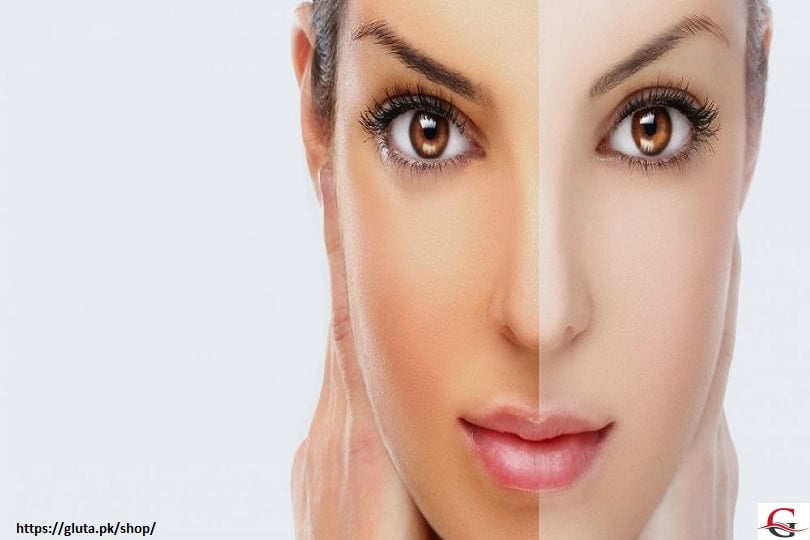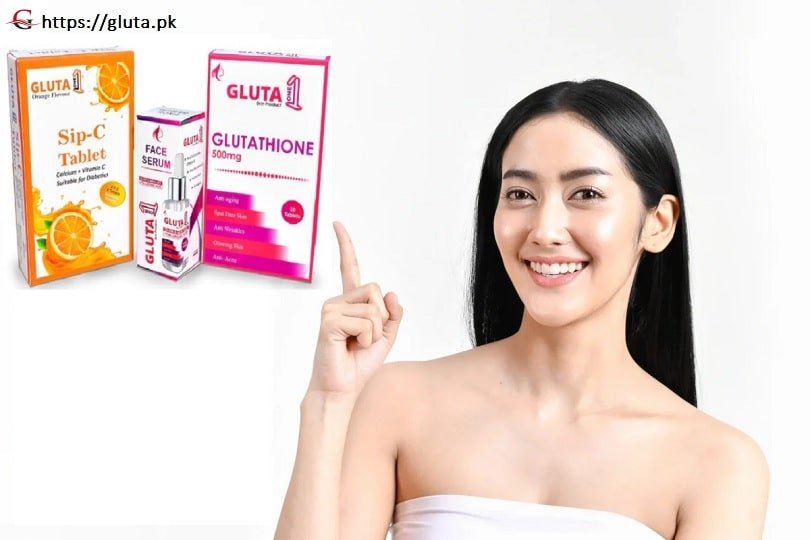Let’s explore How Much Glutathione to Take for Skin Whitening? A burning question now a days. In the pursuit of radiant and flawless skin, many individuals have turned to glutathione as a promising solution for skin whitening.
Normally, skin specialists advise 500 mg capsule or tablet for daily use. But it is highly recommended to consult dermatologist and do not take self decisions on the dosages. Also do check the following details for your further detailed understandings.
Glutathione, a powerful antioxidant naturally produced by the body, has gained popularity for its potential to brighten the complexion and reduce skin pigmentation. This article aims to provide valuable insights into the world of glutathione and its role in achieving a fairer skin tone.
We will explore the appropriate glutathione dosage to ensure safe and effective results while emphasizing the significance of responsible use. If you are curious about incorporating glutathione into your skincare regimen, read on to discover essential information that will help you make informed decisions and achieve your desired skin goals.
Take Away
In the pursuit of skin whitening goals, it’s important to remember that safety and responsibility should always be prioritized. While glutathione supplementation can offer potential benefits, each individual’s response may vary.
Always consult with a healthcare professional for personalized advice and guidance throughout your skin whitening journey. With the right approach and expert guidance, you can achieve a brighter and more radiant complexion while ensuring your well-being and skin health remain at the forefront of the process.
Understanding Glutathione and its Skin Whitening Benefits


What is Glutathione?
Glutathione is a remarkable antioxidant that plays a crucial role in maintaining overall health and well-being. It is composed of three amino acids – cysteine, glycine, and glutamic acid – and is naturally produced by the body. This powerful antioxidant functions as a detoxifier, assisting in the removal of harmful toxins and free radicals from the body. Glutathione is found in various body tissues, including the liver, lungs, and skin, where it helps combat oxidative stress and cellular damage.
Through its potent antioxidant properties, glutathione neutralizes free radicals, which are unstable molecules that can cause damage to cells and contribute to aging, chronic diseases, and skin problems. By fighting oxidative stress, glutathione supports overall health and aids in maintaining the skin’s youthful appearance. You can dig deep into details.
Glutathione for Skin Whitening
One of the most intriguing benefits of glutathione is its association with skin whitening. Many individuals seek glutathione supplements or treatments to achieve a brighter and more even skin tone. The skin-whitening effect of glutathione is attributed to its role in inhibiting melanin production.
Melanin is the pigment responsible for the color of our skin, hair, and eyes. Its overproduction can lead to hyperpigmentation and the formation of dark spots, melasma, and uneven skin tone. Glutathione helps regulate the activity of tyrosinase, an enzyme involved in melanin production. By inhibiting tyrosinase, glutathione reduces melanin synthesis, leading to a lighter complexion and diminished skin discolorations.
However, it is essential to approach glutathione-based skin whitening with caution. The results may vary depending on individual factors such as skin type, genetics, and lifestyle. Moreover, achieving visible results may require consistent and responsible use, in conjunction with appropriate skincare practices.
As with any skincare product or treatment, it is advisable to consult a dermatologist or healthcare professional before incorporating glutathione into your regimen. They can provide personalized guidance and ensure that the approach is safe and suitable for your specific needs. Remember, skin health is a journey that requires patience, commitment, and informed choices to achieve the desired outcomes.
Determining the Right Dosage of Glutathione

Factors Affecting Glutathione Dosage
When it comes to using glutathione for skin whitening, determining the right dosage is essential to achieve safe and effective results. Several individual factors influence the appropriate dosage, and understanding these considerations is crucial for optimizing the skin-whitening benefits of this powerful antioxidant.
- Age: Age plays a role in how the body metabolizes and utilizes glutathione. Younger individuals may have higher levels of natural glutathione production, while older individuals may require additional supplementation to maintain optimal levels.
- Weight: Body weight can also impact the dosage of glutathione. Individuals with higher body weight may need a slightly higher dosage to achieve the desired effect.
- Skin Type: Different skin types have varying degrees of melanin production. Individuals with darker skin tones might require a different dosage compared to those with lighter skin tones.
- Skin Whitening Goals: The desired level of skin whitening is a crucial consideration. Some individuals may seek subtle brightening, while others may aim for a more significant change in skin tone. The skin whitening goals can influence the dosage prescribed or recommended.
While glutathione supplements are available over-the-counter, it is essential to remember that self-prescribing or self-medicating without professional guidance can be risky. Determining the right dosage based on individual factors requires expertise and knowledge.
Consulting with a Healthcare Professional
Before starting glutathione supplementation for skin whitening, it is highly recommended to consult with a qualified healthcare professional, such as a dermatologist or medical practitioner. A healthcare professional can assess an individual’s skin health, medical history, and specific skin whitening goals to determine the most appropriate dosage.
A doctor’s evaluation is crucial to ensure that glutathione supplementation aligns with an individual’s unique needs and does not interfere with existing medications or medical conditions. Moreover, a healthcare professional can monitor the progress and make adjustments to the dosage if necessary.
Remember, the key to achieving safe and effective skin whitening with glutathione lies in making informed decisions and seeking professional guidance. By consulting with a healthcare professional, individuals can embark on their skin whitening journey with confidence, knowing that their health and well-being are in expert hands.
Types of Glutathione Supplements

Oral Glutathione
Oral glutathione supplements come in various forms, including pills, capsules, and sublingual tablets. They are a convenient and non-invasive way to introduce glutathione into the body. Here’s a closer look at each form and their effectiveness for skin whitening.
- Pills: Glutathione pills are one of the most common forms of oral supplementation. They contain glutathione in a solid form, and individuals take them with water or other liquids. The absorption rate of glutathione in pill form can vary depending on the individual’s digestive system and metabolism. While some people may experience positive results with glutathione pills, others may find that the effectiveness is limited due to lower absorption rates.
- Capsules: Glutathione capsules are similar to pills but typically come in a soft gel or capsule form. The soft gel casing may aid in faster digestion and absorption, leading to potentially better results for some individuals. However, like pills, the absorption of glutathione in capsule form can still vary from person to person.
- Sublingual Tablets: Sublingual glutathione tablets are designed to be dissolved under the tongue. This method allows for direct absorption of glutathione through the mucous membranes, bypassing the digestive system. As a result, sublingual tablets are believed to have higher bioavailability and may offer more effective skin whitening benefits for some individuals.
While oral glutathione supplements can be a convenient option for skin whitening, it’s important to keep in mind that individual responses may vary. Factors such as metabolism, overall health, and skin type can influence the effectiveness of oral supplementation.
Glutathione Injections
Glutathione injections are another method of administering the antioxidant for skin whitening purposes. These injections involve directly delivering glutathione into the bloodstream via a needle. The potential benefits of glutathione injections include:
- Faster Results: Since the glutathione is directly injected into the bloodstream, it bypasses the digestive system and is immediately available for use by the body. This may lead to faster and more noticeable skin whitening results.
- Higher Absorption Rate: Glutathione injections are believed to have higher absorption rates compared to oral supplements, as they are not subject to digestive processes that may reduce bioavailability.
- Targeted Treatment: With injections, healthcare professionals can administer precise dosages tailored to an individual’s specific needs and skin whitening goals.
However, it’s crucial to emphasize that glutathione injections should only be administered by a licensed medical professional. Injections should be done in a controlled and sterile environment to ensure safety and prevent any potential complications. Individuals considering glutathione injections should consult with a qualified healthcare professional to determine if this method is suitable for them.
In conclusion, both oral glutathione supplements and glutathione injections offer potential benefits for skin whitening. The choice between the two methods depends on individual preferences, medical history, and the guidance of a healthcare professional. Whichever option individuals choose, maintaining the proper dosage and seeking professional advice is essential for safe and effective skin whitening results.
Recommended Dosages for Skin Whitening

Standard Glutathione Dosage
When it comes to using glutathione for skin whitening, there is no one-size-fits-all approach to dosing. The recommended dosage can vary based on individual factors such as age, weight, skin type, and skin whitening goals. However, there are some general guidelines that can be followed.
For oral glutathione supplements, a standard dosage for skin whitening typically ranges from 500 to 1,000 milligrams per day. It’s essential to start with a lower dosage and gradually increase it, allowing the body to adjust and minimizing the risk of adverse effects. Some individuals may notice gradual improvements in their skin tone with regular use of the standard dosage.
Higher Dosages and Risks
In pursuit of faster results, some individuals may be tempted to take higher-than-recommended dosages of glutathione. However, it’s crucial to exercise caution when considering higher doses, as this approach may pose potential risks and side effects.
Taking excessively high doses of glutathione can overload the body’s natural antioxidant defense system. This may lead to an imbalance in the body and cause adverse effects, including:
- Skin Lightening Imbalances: Higher dosages of glutathione may lead to uneven skin lightening, resulting in patches of lighter skin, especially when taken in excessive amounts.
- Gastrointestinal Distress: Excessive glutathione intake can cause gastrointestinal issues such as nausea, vomiting, and diarrhea.
- Kidney and Liver Concerns: The liver and kidneys play a crucial role in metabolizing and eliminating glutathione. Taking high doses of the antioxidant may put undue stress on these organs and potentially lead to health complications.
- Allergic Reactions: Some individuals may experience allergic reactions to glutathione, especially when taking higher doses.
It’s important to remember that glutathione is a powerful antioxidant, and excessive use may not necessarily lead to faster or better results. In fact, it may be counterproductive and harmful to one’s health.
Before starting any glutathione supplementation, it’s essential to consult with a healthcare professional. A qualified medical professional can assess an individual’s specific needs and recommend the most appropriate dosage for safe and effective skin whitening. Remember, achieving healthy and sustainable results is more important than rushing for quick fixes, and the proper dosage plays a crucial role in achieving that balance.
Combining Glutathione with Other Skin Whitening Methods
Topical Products
While glutathione supplements can be beneficial for skin whitening, combining them with topical skin whitening products can further enhance results. Topical products work directly on the skin’s surface, targeting specific areas of pigmentation and promoting a brighter complexion.
One key ingredient to look for in topical products is vitamin C. Vitamin C is a powerful antioxidant that can help neutralize free radicals, which contribute to skin aging and pigmentation. Additionally, vitamin C can inhibit the production of melanin, the pigment responsible for skin darkening, thus complementing the effects of glutathione.
Another beneficial ingredient is alpha arbutin, a natural skin-lightening agent derived from bearberry plants. Alpha arbutin works by inhibiting the activity of tyrosinase, an enzyme involved in melanin production. When used alongside glutathione, alpha arbutin can target specific areas of hyperpigmentation, resulting in a more even skin tone.
It’s important to remember that while topical products can enhance the effects of glutathione, consistency and patience are key. Results may vary based on individual skin types and conditions, so it’s essential to give the combination of glutathione and topical products enough time to work effectively.
Healthy Lifestyle and Diet
Achieving skin whitening goals with glutathione is not solely dependent on supplements and topical products. A healthy lifestyle and balanced diet play a crucial role in supporting overall skin health and maximizing the benefits of glutathione.
A balanced diet rich in antioxidants, vitamins, and minerals can support the body’s natural antioxidant defenses and promote healthy skin. Foods like fruits, vegetables, nuts, and whole grains are excellent sources of these essential nutrients. Additionally, staying hydrated by drinking plenty of water helps flush out toxins and keeps the skin hydrated and supple.
Furthermore, lifestyle choices can impact the effectiveness of glutathione. Avoiding excessive sun exposure and using sunscreen daily can help protect the skin from UV damage, which can trigger melanin production. Adequate sleep, regular exercise, and stress management also contribute to skin health and overall well-being.
Combining glutathione with topical skin whitening products and maintaining a healthy lifestyle can yield enhanced results in achieving a brighter and more even skin tone. By taking a holistic approach to skin whitening, individuals can optimize the benefits of glutathione and promote healthy, radiant skin from within. As always, it’s essential to consult with a healthcare professional before starting any skin whitening regimen to ensure safety and effectiveness.
Conclusion
In conclusion, glutathione is a powerful antioxidant that has gained popularity for its potential skin whitening benefits. As a natural substance produced by the body, it plays a vital role in detoxification and neutralizing harmful free radicals, contributing to overall skin health.
When considering glutathione for skin whitening, determining the right dosage is essential. Factors such as age, weight, skin type, and skin whitening goals should be carefully evaluated to ensure safe and effective results. Consulting with a healthcare professional is highly recommended before starting any glutathione supplementation regimen. A doctor can assess individual needs, provide personalized advice, and monitor progress throughout the journey.
There are various forms of glutathione supplements available, including oral pills, capsules, and injections. Each form has its absorption rate and effectiveness, and it’s crucial to choose the one that aligns best with your preferences and requirements. However, it’s important to note that glutathione injections should only be administered by licensed medical professionals to ensure safety.
Recommended dosages for skin whitening typically fall within a certain range, and it’s essential to start with a lower dosage and gradually increase it if necessary. Taking higher-than-recommended dosages may not yield faster results and can pose potential risks and side effects. It’s crucial to be patient and consistent in your approach to achieve the desired skin whitening outcomes.
While glutathione can be beneficial on its own, combining it with topical skin whitening products and maintaining a healthy lifestyle can further enhance results. Topical products containing ingredients like vitamin C and alpha arbutin can complement the effects of glutathione and target specific areas of pigmentation. Additionally, adopting a balanced diet, staying hydrated, and practicing sun protection contribute to overall skin health and support the skin whitening process.
FAQs
What is glutathione, and how does it contribute to skin whitening?
Glutathione is a powerful antioxidant naturally produced by the body. It plays a crucial role in detoxification and combating oxidative stress, which can lead to skin damage and aging. When taken as a supplement, glutathione inhibits the production of melanin, the pigment responsible for skin color. By reducing melanin levels, glutathione helps achieve a brighter and more even complexion, leading to skin whitening effects.
How do I determine the right dosage of glutathione for my skin whitening goals?
The appropriate dosage of glutathione varies depending on individual factors such as age, weight, skin type, and desired skin whitening goals. It is essential to consult with a healthcare professional who can assess your specific needs and recommend a suitable dosage. Starting with a lower dosage and gradually increasing it, if necessary, is generally advised to monitor your body’s response and achieve optimal results.
Are there any risks or side effects associated with taking glutathione for skin whitening?
When taken at recommended dosages, glutathione supplements are generally considered safe for most individuals. However, some people may experience minor side effects, such as stomach upset or allergic reactions. It is essential to follow the recommended dosage and seek advice from a healthcare professional to avoid any potential risks or adverse effects.
Can I combine glutathione supplements with topical skin whitening products for better results?
Yes, combining glutathione supplements with topical skin whitening products can enhance the overall effectiveness of skin whitening efforts. Topical products containing ingredients like vitamin C and alpha arbutin can complement glutathione’s action in reducing melanin production and promoting a more radiant complexion. However, it is essential to use such products as directed and avoid overuse to prevent skin irritation.
Is it necessary to consult with a healthcare professional before starting glutathione supplementation for skin whitening?
Yes, it is highly recommended to consult with a healthcare professional before starting glutathione supplementation for skin whitening. A medical professional can assess your health status, evaluate potential interactions with any medications you may be taking, and provide personalized guidance on the appropriate dosage and usage. This ensures a safe and effective approach to achieve your skin whitening goals.

Nadia is a creative and driven individual with a passion for writing and a talent for product development. Born and raised in Pakistan, Nadia always had a flair for creative expression and was drawn to the world of content creation from a young age.
After completing her education in journalism and creative writing, Nadia embarked on a career as a content creator, working for several prominent publications and digital media companies in Pakistan. Her work quickly gained recognition for its innovative approach and compelling storytelling, and she soon became known as one of the most talented and influential writers in the industry.
In her role at gluta.pk, Nadia is responsible for creating engaging and informative content that helps customers learn about the company’s products and make informed purchasing decisions. She also works closely with the product development team to develop and launch new products that meet the needs and preferences of gluta.pk’s customers.



